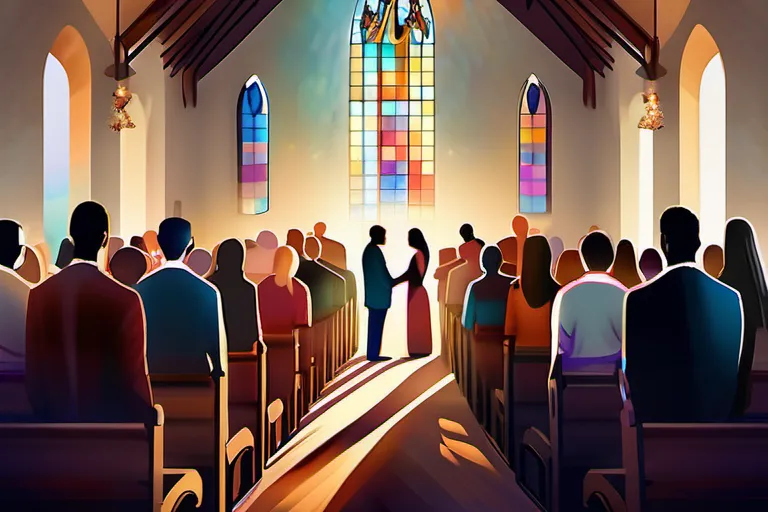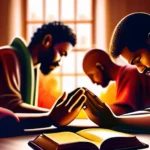Explore the distinctive beliefs, practices, and history of born-again Christianity.
Dive into the world of born-again religion as we delve into its unique characteristics, origins, and impact on modern society.
The Origins and Evolution of Born-Again Religion
The origins of born-again religion trace back to the early Christian movement, but it wasn’t until centuries later that the term ‘born again’ came into common usage. Many wonder, how did this concept evolve from its biblical roots to becoming a cornerstone in modern evangelical Christianity? Born-again Christianity, often associated with the Protestant Reformation, began as a response to perceived spiritual lethargy within the Church of England and other denominations.
Imagine a garden that has been left untended for years. The soil is poor, and the flowers are wilting. This is what some early Christian leaders saw in their churches. They believed that a new spirit was needed to revitalize the faith. In this sense, born-again Christianity can be seen as the rain that awakens the dormant seeds, allowing them to grow into vibrant, living plants.
The modern-day manifestations of born-again religion are numerous and diverse. From charismatic churches with enthusiastic worship services to quiet prayer groups, each community offers a unique expression of faith. However, what binds these communities together is their shared belief in personal redemption through faith in Jesus Christ. How many of us can truly say we have experienced this spiritual rebirth?
As the years passed, born-again Christianity spread across continents, adapting to local cultures and languages while maintaining its core message. Just like a river changes course over time but still flows towards the sea, so too has born-again religion evolved, yet it remains deeply rooted in its biblical foundation.
The journey from ancient texts to modern church pews is one of continuous transformation and renewal. Born-again Christianity invites each believer to embark on this personal journey of faith, promising that through Jesus Christ, they can experience a fresh start—much like the first breath of spring after a long winter.
Key Beliefs and Practices of Born-Again Christians
What Makes Born-Again Religion Unique? A Comprehensive Guide
Key Beliefs and Practices of Born-Again Christians
Imagine a journey that transforms you from darkness to light, from despair to hope, from sin to grace. This is the heart of born-again Christianity, where salvation through faith alone becomes more than just a belief—it’s a lived experience.
Salvation Through Faith Alone
Have you ever wondered how someone can be “born again”? It’s not about being physically reborn but spiritually renewed. In born-again Christianity, this transformation is achieved through faith in Jesus Christ. Is it not remarkable that one simple act of believing can change everything? This belief underscores the idea that salvation comes solely from God’s grace and mercy, given freely to those who trust in Him.
The Importance of Spiritual Renewal
Spiritual renewal goes beyond initial conversion. It involves daily commitment to walk with Christ, seek His guidance, and follow His teachings. Is it not like tending a garden where every day brings new challenges but also new opportunities for growth? This practice includes prayer, Bible study, and engaging in church activities that support this spiritual journey.
The Role of Community
Lastly, born-again Christianity emphasizes the importance of community. Being part of a Christian fellowship provides support, accountability, and encouragement on the path to spiritual maturity. Can you imagine trying to climb a mountain alone versus with a group? The support system makes all the difference.
The essence of these beliefs and practices lies in their simplicity yet profound impact. Born-again Christians find solace, strength, and purpose through faith, making every day a step towards eternal life.
The Role of the Holy Spirit in Born-Again Religion
The role of the Holy Spirit in born-again religion cannot be overstated; it’s like having a personal guide leading you through life’s most challenging journeys. Imagine the Holy Spirit as the lighthouse, illuminating the path to understanding and guiding believers through stormy times with its steady beam. How does this invisible force impact the journey of those who have experienced a born-again transformation?
For many born-again Christians, conversion experiences often feel like being swept away by a powerful current—a spiritual baptism, if you will—where the Holy Spirit washes away their sins and imparts new life. This experience is more than just intellectual; it’s profound and emotional, transforming one’s outlook on life and faith. How can something so intangible create such a profound impact?
The Holy Spirit plays an integral role not only in initial conversion but also in the daily lives of believers. It acts as a constant companion, providing comfort, guidance, and strength. Can you imagine trying to navigate through life’s complexities without a trusted friend by your side? For born-again Christians, the Holy Spirit is that friend—albeit an ever-present, divine one. How do these ongoing interactions shape their spiritual growth?
Through prayer, meditation, and scripture study, believers seek to deepen their relationship with the Holy Spirit. These practices are akin to exercises in spiritual fitness, helping them stay connected and aligned with God’s will. But what exactly happens when someone truly engages in these activities? Is it simply a form of self-help, or does it lead to tangible changes in one’s life?
The significance of the Holy Spirit extends beyond personal experiences; it shapes the very fabric of born-again communities. Just as the wind molds the shape of sand dunes over time, so too does the Holy Spirit mold the values and behaviors of these groups. How do these communal shifts manifest in tangible ways within society at large?
As we explore further into this chapter, consider how the Holy Spirit’s role intertwines with the key beliefs and practices discussed earlier. This divine presence not only guides individuals but also binds them together in a shared spiritual journey. Understanding its significance is crucial for grasping what makes born-again religion unique.
Born-Again Christianity’s Impact on Modern Society
How has born-again Christianity shaped our world? It’s hard to ignore its profound impact on modern society, politics, and social issues. Born-again Christians believe that they have had a personal experience with Jesus Christ, which transforms their life and leads them to share this message with others. This movement has left an indelible mark on communities worldwide.
Consider the role of born-again Christianity in political discourse. Many politicians openly embrace their faith, citing biblical principles as part of their campaign strategies. How do these beliefs influence policy decisions? Do they shape laws and regulations in ways that might not be immediately apparent to non-believers?
In terms of social issues, the influence is even more pervasive. Take, for example, debates around LGBTQ+ rights, abortion, and education policies. Born-again Christians often advocate strongly on these fronts, believing their viewpoints are rooted in divine commandment. But how do these beliefs impact those who hold different views? Is there a middle ground where religious freedom coexists with inclusivity?
The church has also played a significant role in charitable endeavors and community service. From disaster relief to educational programs, born-again churches are often at the forefront of providing aid. Yet, can we be certain that their motives always align with the needs of those they serve? Are there instances where social action is more about proselytization than genuine compassion?
Moreover, consider how media and technology have amplified the voice of born-again Christianity. Social media platforms provide a powerful tool for spreading messages quickly and widely. How has this changed the way religious beliefs are disseminated? Can these tools also serve to polarize communities, creating divisions rather than fostering unity?
The impact of born-again Christianity is multifaceted and complex. It challenges us to think deeply about the role religion plays in our lives and how it influences both personal choices and societal norms. As we explore further into this topic, remember that understanding these dynamics requires a balanced perspective—acknowledging both the positive contributions and the potential pitfalls.
The Born-Again Movement in Different Regions of the World
The born-again movement has taken on distinct flavors across different regions, much like spices adding unique tastes to a global dish. In Africa, for instance, born-again Christianity has intertwined deeply with local traditions and beliefs, creating a rich tapestry of faith that resonates both with traditional customs and modern evangelical teachings. How does this blend differ from its counterparts in North America or Latin America?
In Latin America, born-again Christianity has been particularly influential, especially during the charismatic movement of the 1960s and beyond. Here, the emphasis on personal transformation and direct experience with God has led to vibrant church services filled with testimonies and prayer meetings. Can you imagine a Latin American born-again service where every attendee shares their journey under the pulpit?
In North America, the born-again movement has had a more established presence, shaping not only religious communities but also broader cultural norms. This region’s emphasis on personal salvation and community outreach has seen significant growth in evangelical churches and missionary activities. How does this focus compare to the more indigenous approaches found in Africa or Latin America?
The unique expressions of born-again Christianity across these regions highlight the dynamic nature of this movement. Each area brings its own cultural context, creating a mosaic of beliefs that are as diverse as they are unified under the common thread of personal spiritual rebirth. Do you think the global spread and adaptation of born-again Christianity enriches or dilutes its core message?
By exploring these regional differences, we gain insight into how the born-again movement adapts to local contexts while maintaining its essential teachings. This diversity not only strengthens the faith but also challenges us to question what makes born-again Christianity truly unique in our interconnected world.
Controversies and Criticisms Surrounding Born-Again Religion
Have you ever wondered why some people feel excluded when they hear about born-again Christianity? The term ‘born-again’ often conjures images of strict adherence and rigid beliefs, leading to debates over whether this form of Christianity truly embraces inclusivity or perpetuates exclusivity.
The controversies surrounding born-again religion stem from its emphasis on personal conversion and a belief in the exclusive path to salvation. Some critics argue that these beliefs foster an environment where those who do not adhere strictly to their doctrines may feel ostracized. Is this really about spreading love and redemption, or is it more about maintaining a fortress of righteousness?
Consider the metaphor of a garden. In born-again Christianity, this garden is often carefully tended, with clear delineations between what thrives and what withers away. Critics see this as restrictive, limiting the space for diverse flowers to bloom. But isn’t religion, at its core, about embracing diversity and fostering growth? Could it be that in our quest for purity, we overlook the beauty of imperfection?
Moreover, accusations of intolerance often arise from perceived harsh judgments or discriminatory practices within born-again communities. How do these attitudes align with the teachings of Jesus, who preached love and forgiveness? It’s a rhetorical question that challenges us to examine whether our actions truly reflect his message.
The path of born-again Christianity is indeed unique, but it raises important questions about inclusivity and diversity in religious practice. As we explore this journey further, perhaps we can find ways to navigate these controversies with empathy and understanding, ensuring that the religion’s core values of conversion and salvation are accessible to all.
Conclusion
 Gain a deeper understanding of the born-again faith and appreciate its role in shaping spiritual journeys worldwide.
Gain a deeper understanding of the born-again faith and appreciate its role in shaping spiritual journeys worldwide.











